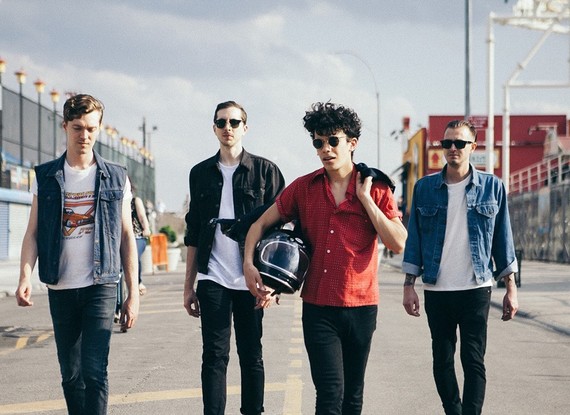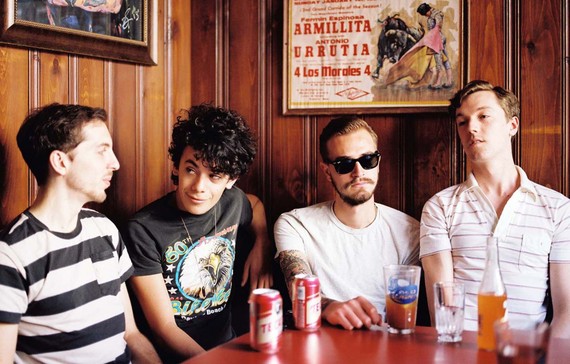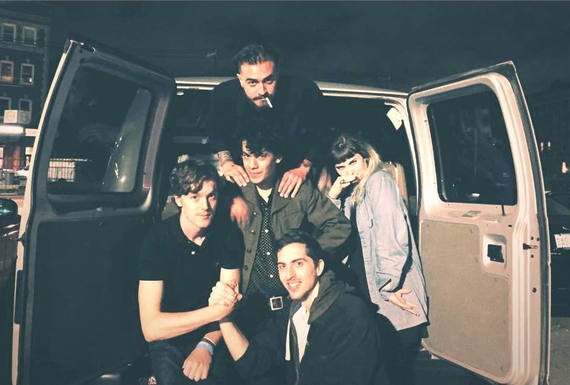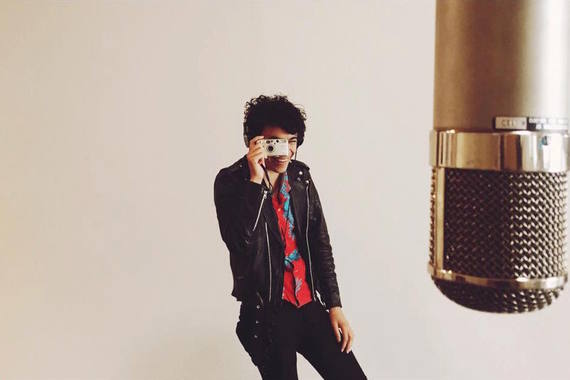Featured in Nylon, Spin, and Stereogum, Mainland is receiving some well-deserved recognition for their hard work and infectious music. The band's blended east coast/west coast vibe combined with their often dark, always upbeat musical style and magnetic stage presence make them a designated standout among other bands of similar genres.
I recently had the opportunity to chat with the wonderfully charismatic singer and guitarist of Mainland, Jordan Topf. Read on as we talk "Outcast," satanic vans, and how a bit of misfortune for Macaulay Culkin came to be a life-changing opportunity for Mainland.
Hi Jordan! So, tell me a little about your background. I know that you grew up in California -- when did you move to New York?
I moved to New York in 2009. I was in Manhattan for 2 years, then I moved to Brooklyn in 2011. I've been there since then, four years now.
Was that a difficult adjustment for you, having lived on the west coast your whole life? It's quite a big culture change.
I think when you hit 18, you're kind of looking for a means to escape. At least I was, escaping my rural California upbringing.
Definitely. Thinking back, I probably would have gone anywhere for that taste of freedom.
You gotta flee the nest.
I also tend to think life gets a bit boring if you stay in one place too long -- I like new places and beginnings. New experiences.
L.A. is such a romantic place. It kind of seasons what we think about, you know? There's a lot of self-discovery and struggle in your everyday life to find meaning when you're younger. I never really found that living in California, maybe because I'd been there for so long.
I think when you grow up around a lot of like-minded people, you tend to develop a certain frame of thought and take on those beliefs yourself without questioning them. In New York, you're exposed to much more diversity and it challenges your beliefs. It kind of changes you as a person.
Yeah, it's just a place where people go to find themselves. Find their own like-minded people. With Mainland, we met each other in such different circumstances. I met our guitarist, Corey, at a party in New York. Our bass player Alex and I met working together. We all used to work at this place called The Bowery Hotel. It was a point in time where the three of us were working at the same hotel, wearing suspenders and black ties, working those kind of events. We'd spend time together both working and making music. I think that's when we knew we were in this for the long haul.
As a developing artist, what do you think you struggle with the most?
I have this motto that I think is really important. "Compare and despair." I've been comparing myself to people in a way that's detrimental to my success as a musician and a human being. But on the flipside of that, in comparing yourself to your idols, you'll be just that. You'll be as strong as your idols, you know? And to me, 300 really goes after people that can be crafted into musical icons. It's something that they look for. If you're going to compare yourself, compare yourself to your idols. Your friends or anyone you know may have certain qualities or things that you don't, but it doesn't matter. Compare yourself to John Lennon. Compare yourself to the greats.
I think that's the only way you can really grow. I read something once that's always stuck with me. The gist of it is that the intelligence, success, talent (or any positive quality) of someone else doesn't lessen those traits within yourself. I think it's important to remember that, especially when you feel "less than." I think that's a struggle for everyone, really.
Yeah, we live in a generation where we're constantly being reminded of other people's success. When we were writing our record, I was fed up with a lot of things. I was fed up with my job at the time. I just wanted to shut myself off. Maybe not shut myself off, but stop caring about what other people were doing and just focus on what I was doing. And that's when it started to click for Mainland. That's when we started writing these songs that ended up being on our new album.
That's when the creativity flows, when you stop caring about what other people are creating.
I read a quote from you, stating that you enjoy performing because you like bringing people together and having that emotional connection. I tend to think that desire for emotional connection comes from feeling a bit alienated, intrinsically. In reference to both this quote and your single, "Outcast," did you feel that way growing up?
I've felt that way before. I think everyone in this world has felt like an outcast at some point. The song touches on all the different times you've felt like one; in a relationship, at your job, in school. I think the feeling I had when I wrote that song is that I was feeling like an outcast in the relationship I was in, where I felt kind of lost. But I became okay with that fact, and let it happen the way it was meant to unfold.
I think when we play that song live, people really connect with it. Because it's not just about one time you felt like an outcast, it's about all of those times strung together. Outcast to your mother, outcast to each other, outcast to yourself. Not knowing who you are. And then just being okay with that. I wanted to put a positive spin on it -- making it okay to accept that feeling.
You know how people say "life flashes before your eyes" when you are in a life-threatening situation? For me, that's a metaphor for what you've explained. When I listen to certain songs, it's like a movie in my head -- a compilation of all the times I've felt whatever feelings that song elicits. That's why the experience of listening at a concert is so intense and powerful, because it's live, it's more authentic, and those memories are all crammed into 4 minutes.
Switching gears a bit here. I wanted to ask you about something personal. However, feel free to pass if you'd prefer not to answer.
The death of your father must have been a really hard time and made a huge impact on your life. How did you cope with the grieving process? Did you find music to be soothing or did it make things more painful for you?
My dad was the reason I fell in love with music. He shared a lot of music with me and gave me the tools when I was younger to really pursue it as something more than a hobby. When he left this world, I'd been doing music for a really long time. But he was always a hard worker. He just always wanted to see me putting my mind towards something.
So when my father passed away, we [the band] bought our first van and went on tour. I think it was maybe four weeks after he passed. It was sort of a whirlwind, but it was also a catalyst for us to follow our dreams. I mean, especially to follow the dream that I had in the group. I think after we took that initial risk, things started happening. Our whole story really started to unfold.
How long ago was that?
That was in 2013, so when we released our first EP. I know it's what he would have wanted me to do. To not be sad. He would have wanted me to keep going. We had a really good relationship and we were able to say goodbye. And it was a lot to process and I was able to cope with it by focusing even harder on my music. I guess it motivated me to work harder, you know? We did the Shiner EP, we met Jim Eno of Spoon in Austin, who set the recording process in motion, we toured a bunch, and then we signed with 300 about a year later. After that, things really started to change.
In the past, you've described your music as nostalgic, dark, and naked. Do you think this describes your new album? How has your style changed since your first EP? How do you see yourselves growing as artists?
I think we've just gotten more savvy with how we come up with our songs. We studied a lot of our favorite 80s British bands and how they craft pop songs and mask them in provocative, melancholy love stories.
I think we came to a point where we said we could keep doing garage rock for a long time, or we can try something else. And I think we were really interested in exploring influences like The Cure and Depeche Mode, and similar sounds that we had just recently discovered. I think the experiences we were going through in our own lives -- my own life -- really reminded me of the things that those bands sang about.
We were more "punk" before and I think we arrived upon a more honest statement with this record. Talking about real life shit, like relationships that didn't work anymore, having no money, suffering in New York. But also gaining perspective on life and achieving certain successes.
You mentioned in an interview that you wanted to interact with audiences in major cities by "introducing curious and artful propaganda." I'm just wondering exactly what you meant by that? I am intrigued.
Ha-ha. Yes, I did say that!
I think just breaking down the generic form of promoting art is what I meant by that. I think it's really important, because there's so many bands out there. You don't want to be another run-of-the-mill band, you want to present yourself in an interesting way. A lot of what interests me about being in a band isn't just the music, but creating this larger than life enigma of the band.
We're also really into taking photographs. We take photographs to create or immortalize the band as a cultural figure, in a way.
More curiosity -- why did you name your van "Lucy?"
We actually ended up selling Lucy, for the record. But we named her Lucy because there was a 666 on the license plate when we bought the van. So it's short for Lucifer.
Ah, more interesting than I suspected. I thought you were going to say something like, "We named her after my beloved great-grandmother, Lucille."
[Laughs.] No, but it was really crazy to find out that there was a 666 on the license plate. It was kind of scary to see that. But she was a great van! She never broke down. It's so funny that's she's made her way into interview questions. It's too bad we had to sell her recently. A lot happened in that van.
There definitely had to be sentimental value there. So I read an interview of yours that mentioned some sort of Home Alone type scenario? I couldn't really follow. Care to explain?
Oh yeah! Well, we met Macaulay Culkin and watched him get punched in the face in a karaoke bar in New Orleans, which led to us meeting our first booking agent, which led to us signing with 300 Entertainment!
Now there's a story! I'm very curious as to why Macaulay Culkin was punched in the face.
It's such a ridiculous story! We went to SXSW and our manager called and asked if we could give this booking agent a ride. So we gave him a ride and we had a really great time with him. We were drinking out of a casino/gas station on the border of Texas and Louisiana. He had booked The Pizza Underground [Macaulay Culkin's band].
They played, and after the show we were hanging out with Macaulay and this girl goes up to him in this super-crowded, low ceiling, Christmas-lanterned covered French Quarter karaoke bar. She said, "Are you Macaulay Culkin?" He answered, "Yeah," and she just sucker punched him in the face. True story. And I don't know why. Maybe she was on quaaludes or something.
I'm sorry, I'm trying not to laugh.
That's how we met our booking agent, who invited us to meet up with 300. That was around the time we were building a name for ourselves. It was all those things combined, giving the booking agent a ride who'd been ditched by The Pizza Underground -- we just happened to be going to New Orleans too. How we got to record at Fairfax, formerly Sound City. It was a number of things that all came together in a weird way. It's been a roller coaster ride, for sure.
That's a movie plot right there. The kind of story you look back on and say, "We got started this way and it was crazy and bizarre and awesome. So tell me more about the recording process at Sound City."
Sound City, formerly Fairfax, is the same room where so many great artists recorded. Fleetwood Mac, Nirvana. We brought in Jason Corsaro [Madonna, Duran Duran, Iggy Pop] to co-produce the album with Kevin Augunas [Cold War Kids, The Lumineers, Edward Sharpe and The Magnetic Zeros]. Although the record has a lot of dark sentiment to it, I think it was really important to progress the roots of where the band is from. We're all from California, and it's very apparent when you meet us that that's who we are.
It must have been a surreal experience to work in such a legendary studio with such an iconic producer.
It's a really special place. We want to do every record in a different city. That's something we've been interested in. The last place we recorded was Austin and I feel like environment is so essential to how stuff sounds. And for us, making this first album was a return, a homecoming. And we wanted it to sound like that.
I like that. It's a great way to make each album more special and memorable. So, is there anything else you'd like to put out there or anything you'd like to say to your fans?
Just hearing from the fans we have -- a little note, a little anything -- it really gets us through our days. It makes us so happy to hear from people who are connecting with the music. We have this red notebook that says "Love Letters" on it and we bring it to shows for people to write in, kind of like a guestbook. They're our guests at the concert. We're just really interested in connecting with people.
That's a cool piece of memorabilia you'll be able to look back on and appreciate years from now. I'm glad we ended on a happy note, it got a little dark there!
Yeah, I mean I thought this was gonna be about tacos!
Ha-ha, sorry about that!
No, I'm glad you asked the raw questions -- I gotta give you something to write about!
I appreciate it!
Alright Lauren, amazing interview. Legendary.
Legendary, indeed. Thank you for being so open about everything and sharing your stories. I hope you have a great time in San Francisco and I wish you lots of success!
Thank you so much, it means a lot.
View full interview here.
Visit iTunes or Spotify to hear Mainland's latest single, "Outcast." Mainland will be performing at Elvis Guesthouse in NYC on 9/8 and 9/15. They will also be supporting Atlas Genius and Dreamers on tour this September. Click here for the list of tour dates. Night Trials will be out in early 2016 via 300 Entertainment/Atlantic Records.
Special thanks to Golightly Media and 300 Entertainment/Atlantic Records for the opportunity! To learn more about the author, visit laurenkruczyk.com.



